* * * * * * * * * *
Continuation of an 8-Part Series
Part 1 -
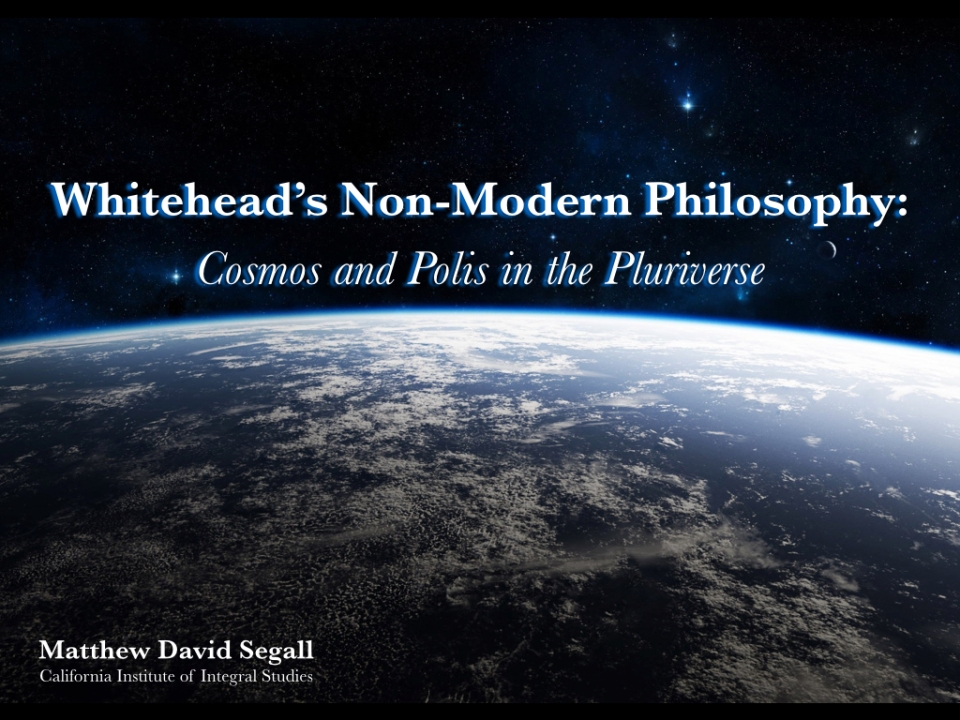
* * * * * * * * * * *
A continuation from previous post -
* * * * * * * * * * *
Whitehead’s Non-Modern Philosophy: Cosmos and Polis in the Pluriverse (draft)
by Matthew T. Segall
May 24, 2015
The following was an early draft of a talk I gave in my own track at the Whitehead/Ecological Civilization conference in Claremont, CA. For video of the actual talk, click HERE.
This track has been given the task of re-imagining late modernity, and in particular, of re-imagining what John Cobb has called late modernity’s reductive monism. In my talk today, I want to try sketch a cosmopolitical alternative to late modernity’s reductive monism as part of an attempt to begin preparing us, at least in the realm of ideas and imagination, for a ecological civilization to come. My approach will not be systematic, but pluralistic. I aim to sketch an alternative to modernity by drawing out the metaphysical possibilities opened up by ontological pluralism. My method is one of philosophical “assemblage,” which Whitehead suggests should precede the stage of careful systematization. System comes later, after the owl of Minerva has flown (as Hegel has suggested), when we have time for careful reflection about details. Right now, matters are rather urgent and there is no time to fill in all the details. This is philosophy in a time of emergency. An old story is dying, and we need as many hints about the new one emerging as we can manage. It’s my hope that a people to come will find more room to breathe in the processual pluriverse I’ll attempt to sketch than modern people have found in their incoherently bifurcated and so alienating picture of a materialistic universe.
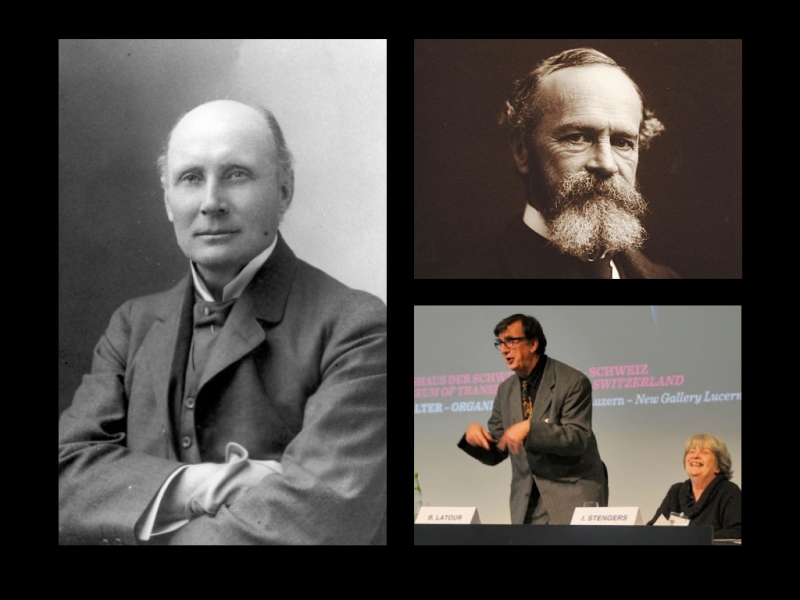
I will draw, of course, on the thought of Alfred North Whitehead, the man of the hour. But also on William James, one of Whitehead’s most important influences. In addition I will build on the work of the contemporary French Whiteheadians Isabelle Stengers and Bruno Latour.
Let’s begin by unpacking the title of the track a bit. To better grasp the metaphysical underpinnings of “late modernity,” maybe its best to start by comparing it with “early modernity.” Early modernity was dualistic: on one side of the ontological divide were rational subjects, who by freely entering into a social contract, became citizens in a democratic state; on the other side were mechanical objects, which by obeying universal causal laws, operated as part of a deterministic nature. Human society on one side, nonhuman nature on the other. Modernity thus began with a twin mission, what Latour refers to as the “double task of emancipation and domination” (We Have Never Been Modern, 10). The emancipatory task was political: to end exploitation of humans by humans. The task of domination was technoscientific: to become masters and owners of nature.
So what has happened? Why did late modernity become monistic, as Cobb describes it? For one thing, the 19th century brought the discoveries of geological deep time and evolutionary theory, both of which placed the human/nature dualism of the 17th century on far shakier ground. A metaphysical decision was made to reduce human beings to one side of the former ontological dualism, and so we have increasingly been understood as only a more sophisticated form of biological machine. The alternative way of establishing a human/nature continuity would have been to re-imagine nature as, like us, in some sense ensouled (an alternative we will explore momentarily).
Even more important in the collapse of dualism into monism, however, was the 20th century failure of communism. What many would consider to be our greatest hope of ending exploitation of humans by humans was outlasted by capitalism, which has since given up on modernity’s emancipatory mission and doubled down on domination. The failure of communism, neoliberal capitalists say, showed once and for all that human nature is basically selfish. Capitalists argue that domination and mastery of both human labor and natural resources through a kind of market monism is our only hope for an albeit quasi-civilized existence. Only the invisible hand of the market can assure the stability of civilization. Everything from politics to religion to education to healthcare should be given over to the free market, as though no other form of self-organization could help order our societies. As the Jamesian political scientist Kennan Ferguson describes it in his book Politics in the Pluriverse, late modernity brought a “shift in political science toward representing political actors as economic consumers. The increasing economism of political science has meant that many of the issues of interest to political philosophers–sovereignty, legitimacy, representation–have been recast as potential choices in a marketplace of ideologies, where voter/consumers are peddled competing brand names” (27). What’s clear is that the 20th century only led modernity to replace one war with another, the Cold War for the Warming War. Capitalism no longer faces another human enemy. It is now at war with Gaia.
As Latour says, “By seeking to orient man’s exploitation of man toward an exploitation of nature by man, capitalism has magnified both beyond measure” (Modern, 8). Our situation as late modern people is stated starkly by Latour: “between modernizing and ecologizing, we have to choose” (AIME, 8).
Ecologizing our civilization will require re-imagining the philosophical assumptions underlying the modern worldview. “A philosophic outlook,” writes Whitehead, “is the very foundation of thought and of life…As we think, we live.” I think I speak for all of us in this track, and perhaps for this entire conference, when I defend the simple thesis that ideas matter. Philosophy is not merely mental entertainment. On the contrary, it is a matter of life and death. As Whitehead argues, the dominant philosophy of every age “moulds our type of civilization” (Modes of Thought, 63). Modern philosophy, largely shaped by Descartes’ understanding of the relationship (or lack thereof) between the free human spirit and an entirely mechanical nature, has been thoroughly critiqued by contemporary environmental philosophers for its ecologically disastrous side-effects. Most serious thinkers no longer consider dualism to be a “living option,” as William James would say. Descartes’ early modern dualism split spirit from matter so thoroughly that it left no room for life. Late modern market monism—by reducing earth to, at best a resource, and at worst a trash bin, and by reducing human beings to cogs in a technocapitalist profit machine—has gone even further, since it not only leaves no room for life, it actively seeks to exterminate it. The currently unfolding mass extinction is not at all surprising as the outcome of modern philosophy. To Whitehead’s statement we must add the corollary statement: As we think, we die. Both dualism and monism have failed us. At this point, as Latour puts it, “we have to fight trouble with trouble, counter a metaphysical machine with a bigger metaphysical machine” (AIME, 22). I’m following Whitehead, James, Latour, and Stengers in proposing an alternative, more ecological metaphysical scheme.
Ontological pluralism is easy to define, but not as easy to understand. It is the metaphysical position which suggests that there are more than one, or two (or three, or any finite number…), of ways of being. Reality is the ongoing composition of a multiplicity of more or less overlapping modes of existence. We are so used to thinking of reality being unified, a finished One, that the possibility of its becoming many may at first seem like a terrifying prospect. To the extent that modern inheritors of the liberal tradition really understand it’s implications, it should be terrifying, since it dissolves all our hubristic certainties about ourselves and the world, about who and where we think we are. Part of the rationale behind the modern bifurcation of nature is that defining nature or matter as inert, dead stuff helped us establish our own identity as free agents. To challenge the inertness of nature, to recognize its agency, is also to challenge liberal notions of individual human freedom. Challenging these notions does not mean dismissing them–we are agents, too; but it does mean re-imagining the very foundations of individual identity and social contract-based politics.
There are less radical forms of pluralism, like cultural relativism or worldview pluralism. Everybody knows there are other ways of knowing, other cultural practices with their own psychological and even perceptual ways of representing reality; moderns accept that there are multiple views of the world. But what nobody doubts is that one world underlies all the views that humans can have of it. Many views, one world; many cultures, one Nature.
Ontological pluralism is not multiculturalism, but multinaturalism. Multiculturalism, as Latour points out, is only the flip side of “mononaturalism.” Modern Western people have for a few hundred years thought of themselves as only a “half-culture,” since unlike all other earthly peoples, they were also the practitioners of something called Science, the faithful servants of something called Reason. Their Science and Reason, so the story goes, granted them access to an objective and universal Nature, an external world “out there” that for so much of human history had remained buried beneath cultural projections and superstitions. Moderns sent their anthropologists to study exotic peoples in far away lands, always assuming that no matter how different those people appeared at first glance, beneath the surface the same universal laws belonging to the same physical nature must be governing their behaviors. Yes, we Westerners also have our subjective quirks, our psychological complexes and superstitions, but still, only we had the good fortune to have discovered a way to uncover Nature, to put aside our cultural idiosyncrasies so as to reach naked and indisputable matters of fact. It then became our sacred duty to educate others about the One True World. Prior to modern European science, medieval European religion had attempted something similar. There was one God, one final divine arbiter who decided what was Good and True for everyone. For modern scientific people, the one major difference is that the one Nature is understood to be entirely disenchanted and meaningless. Latour describes the paradox:
“… modernization compelled one to mourn the passing of all one’s colorful pretensions, one’s motley cosmologies, of all the many ways of life with their rich rituals. ‘Let us wipe away our tears,’ the modernists liked to declare, ‘let us become adults at last; humanity is leaving behind its myth-imbued childhood and is stepping into the harsh reality of Science, Technology and the Market. It’s a pity but that’s the way it is: you can either choose to cling to your diverse cultures, and conflicts will not cease, or, alternatively, you can accept unity and the sharing of a common world, and then, naturally (in every sense of the word), this world will be devoid of meaning. Too bad, love it or leave it.’ One may wonder whether one of the many metaphysical origins of the twentieth-century world wars did not consist of this odd way with which the West sought to pacify all conflicts by appealing to a single common world. How long can one survive in peace when torn by this impossible double bind with which modernizers have trapped themselves together with those they have modernized: nature known by reason unifies, but this unification is devoid of meaning?” (11-12).
Whitehead’s self-entitled “philosophy of organism” provides us with an example of a fully ecologized philosophy. Multinaturalism means neither science nor the universe it purports to study are ready-made unified wholes. There are as many sciences as there are natures. From a pluralist perspective, if wholeness is to exist, it must first be constructed and thereafter constantly maintained. Unity does not exist in advance of such composition. If any science qualifies as the science of “wholes”—and in a pluralist ontology, there are many wholes, not just One—it is ecology, which traditionally has been defined as the study of the relationship between organisms and environments. But in Whitehead’s scheme, the concept of an “environment” cannot just be taken for granted as a fixed, inorganic background. The environment is not, as Latour put it in his Gifford lectures on Gaia, “a mere frame devoid of any agency.” There is no Environment, there are only ever communities of other organisms. In an ontology of organism, physics and chemistry are no longer considered to be descriptions of the meaningless motion of molecules to which biology is ultimately reducible, but rather themselves become studies of living organization at ecological scales other than the biological. In other words, ecology replaces physics as the foundational science.
An ontology of organism opens us to the possibility of cosmopolitics, a concept originally developed by Isabelle Stengers. Cosmopolitics has been articulated as a protest against what Whitehead calls “the bifurcation of nature,” the splitting off of human consciousness and values from everything physical and factual. We are left by this all too modern predicament, Whitehead tells us, having to somehow reconcile the “dream” of our common sense experience of an apparently meaningful world with the scientific “conjecture” of a mind-independent and so meaningless reality. Ontological pluralism, unlike modern dualistic and materialistic metaphysical schemes, rejects the division of appearance and reality, experience and nature, and instead suggests a panpsychic vision of things: “Everything perceived is in nature,” and everything in nature perceives. There is no bifurcation: to speak crudely, mind belongs to nature, is intrinsic to it.
Whitehead says in Process and Reality, “We find ourselves in a buzzing world, amid a democracy of fellow creatures” (50). Whitehead here alludes to perhaps his most significant influence, William James, who famously referred to the experience of pre-egoic infants as a “great blooming, buzzing confusion.” In A Pluralistic Universe, one of the last significant lectures James delivered before his death a year later, he suggested that “The common socius of us all is the great universe whose children we are” (lecture 1). Cosmopolitics calls upon us to recognize that the polis, the city, is not just built by and for us on a planet passive before our projects. We must wake up from the nightmare of bifurcation to our roles as creaturely citizens of an earth community.
If modernity has culminated in the bifurcation of mononaturalist Science and multiculturalist politics, then the emergence of a nonmodern, ecological and so ontologically pluralistic civilization will require the reinvention of both. Not only must ecology replace physics at the foundations of the natural sciences, it must replace economics at the foundations of the social sciences, as well.
Cosmopolitics is an attempt to do just that, to re-imagine scientific practices in more democratic terms, and to re-imagine politics in a way that acknowledges the need to invent ways of coexisting—not just with people of our own color, country, or culture, not even just with other humans—but with all earth’s creatures. To democratize science doesn’t mean facts should be determined by popular opinion; rather, it means recognizing that scientific activity is always undertaken upon a landscape shaped by socioeconomic interests and fraught with political implications. Knowledge is an ecological affair, an ongoing and risky process of buiding alliances and relationships between humans and nonhumans across wide distances; it is not, despite modern epistemic pretenses, the product of an objectifying gaze from nowhere. Stengers points out the tendency many modern scientists and technologists have to “defer to ‘politics’ decisions that would have to be made about the use of data and techniques produced in new labs: that use will be whatever ‘we’ decide it should be. But this ‘we,’ purely human and apparently decisional, will intervene in a situation that will already be saturated with decisions made in the name of technique, science, and rationality. Politicians will demand that experts tell them who ‘we’ are from the scientific point of view.” [personal example with Marvin Minsky from 2007; another example is Francis Collins and Obama announcing the Brain Initiative].
Whereas early modern dualism and late modern monism alike produced “expert” scientists who claimed to have unmasked with objective certainty a truth hidden from common sense experience, pluralism is an intrinsically diplomatic ontology.
The pluralist responds to encounters with others under the assumption that reality is an ongoing and open-ended “geostorical adventure” of “planetary negotiation,” which is to say it is always in-the-making and never at rest in the possession of a isolated heroic knower. The ontological pluralist doesn’t falsely align fetishized ideas of “Science,” “Rationality,” and “Objectivity” on one side and oppose them to “belief,” “custom,” and “illusion” on the other. Instead of in every case sending in “the experts” to tell local populations how to solve their problems, assuming in advance that scientific knowledge is universal and that only science has the right to produce knowledge, every issue is approached diplomatically under the very different assumption that knowledge is relational, its claims conditional, and its construction, risky. Cosmopolitics is not cosmopolitanism, not rooted in the search for some abstract sense of universal humanity. The notion of “human rights” may have functioned in a liberatory way in some cases, but just as often, argues Stengers, it has served as a way of disqualifying those whose unique ways of life fail to fit the universal mold. Stengers criticizes this modern attempt to politically unify all peoples through an all too abstract notion of “humanity.” Such an attempt moves too fast, pretending to achieve in advance what can only be accomplished at the end, after much negotiation. As Latour puts it, “unity has to be the end result of a diplomatic effort; it can’t be its uncontroversial starting point.”
Stengers links the failed notion of human rights to “the curse of tolerance,” the idea that so long as you keep your differences private, we can learn to live together in public. In other words, so long as you don’t take your own cosmology seriously and are willing to accept the strange mononaturalist/multiculturalist double-bind of modernity, then we can tolerate one another’s abstract “right” to exist. So long, of course, as you stay over there, in your own neighborhood, and don’t force me to deal with the dissonance of such a strangely bifurcated image of reality too directly. For this all too abstract form of peace would quickly dissolve if we concretely encountered one another’s differences. If there is to be a future cosmopolitical civilization, it will no longer accept the dichotomy between public and private life. We will have found a way to meet the challenge of inventing a means of living together within the same extended community. We will all have become diplomats, willing to exist in the tension-filled space between worlds, to accept that our own identities are always risked in encounters with others, acknowledging that our own world must be unfinished so long as it leaves “others” outside it.
So what is the take home of this assemblage of nonmodern Whiteheadian philosophical ideas? What is the relationship between his metaphysical scheme and the ecologization of our species, of our civilization?
How can he help us transform our cities from gas guzzling machines into creative contributors to life’s flourishing? How are we to convert his cosmological theory into a cultural and political practice that leads us home again, that allows us to remember that we are earthbound creatures inhabiting and transversing a plurality of interrelated places co-evolving at a multiplicity of speeds. We do not inhabit a unified space-time field determined by universal laws. We are not made of some fantastical stuff called “matter,” the most abstract, insensible, confused idea I’ve ever heard. What I am suggesting is that Whitehead’s speculative cosmovision evokes an alternative form of consciousness, provoking a re-imagination of modern subjectivity; Whitehead heralds the transformation of the American Dream of human individuality and natural property into the Dream of the Earth, as Berry calls it, or geostory as Latour refers to it. Whitehead’s words work upon our souls like alchemical catalysts. His books are a psychedelic pharmacopoeia, a remedy for sick minds. He is a philosophical diplomat: he heals the divisions of our intellectual histories, not by rushing to unify them into a Single System, but by giving each perspective, each contrast, its place in a organic community of interrelated drops of experience somehow managing to hang together as a whole, not by necessity, by right, by divine fiat, but because of the persuasive allure of beauty freely calling all creatures toward harmony and order, toward cosmos.
The natural world, the universe, the cosmos, Nature, etc., is not something we can continue to imagine as apart from, other than, the human world, the polis, society. The cosmos is just as political as we are, just as much a society of agents vying with one another for power, for access to energy, to food, to sex, to status and attention.
End
End
* * * * * * * * * * *
RELATED TOPICS BY M. SEGALL
"WHITEHEAD AND MARX: A COSMOPOLITICAL APPROACH TO ECOLOGICAL CIVILIZATION"
* * * * * * * * * * *
"COSMOPOLITICS AND DECENTRALIZING THE MOVEMENT"
CONTINUE READING
* * * * * * * * * * *
CATHERINE KELLER: THE COSMOPOLITICAL ENTANGLEMENTS OF PROCESS-RELATIONAL THEOLOGY"
RELATED TOPICS BY M. SEGALL
"WHITEHEAD AND MARX: A COSMOPOLITICAL APPROACH TO ECOLOGICAL CIVILIZATION"
Below is a recording of my talk (a video first, then audio only that includes the discussion afterwards). I’ve also included an extended draft of some notes I took to prepare my talk. Finally, I’ve included my notes taken while listening to Jason Moore during yesterday’s opening lecture. Fifth annual conference of the World-Ecology Research […] CONTINUE READING
* * * * * * * * * * *
"COSMOPOLITICS AND DECENTRALIZING THE MOVEMENT"
CONTINUE READING
* * * * * * * * * * *
CATHERINE KELLER: THE COSMOPOLITICAL ENTANGLEMENTS OF PROCESS-RELATIONAL THEOLOGY"
In what follows, I offer some reflections on the feminist process theologian Catherine Keller’s book Cloud of the Impossible: Negative Theology and Planetary Entanglement (2015). Keller poetically folds her refreshingly open theological orientation into an array of important planetary topics,—including the ethical implications of quantum entanglement (chapter 4), the poststructuralist dissolution of substance (chapter 5) […] CONTINUE READING"
* * * * * * * * * * *
"BIG HISTORY AND COSMOPOLITICS"
Some friends of mine presenting at the upcoming Big History conference at Dominican University. CONTINUE READING
* * * * * * * * * * *
COSMOPOLITICAL THEOLOGY: VIOLENCE, VALUE, AND THE PUSH FOR A PLANETARY PEOPLE"
This is a talk I gave back in September for my colleagues at CIIS during our annual retreat to Esalen in Big Sur, CA. CONTINUE READING"
* * * * * * * * * * *
"ISABELLE STENGERS ON COSMOPOLITICS"
CONTINUE READING
* * * * * * * * * * *
"COSMOPOLITICAL REFLECTIONS ON ECONOMY, SOCIETY, AND RELIGION"
When was the day that money became an idol instead of an instrument? Was it August 15, 1971, when to pay for the Vietnam War Nixon shocked the world by erasing the Gold Standard, thereby unilaterally making the value of the US Dollar the reserve currency of the world economy? Or was it in the […] CONTINUE READING
* * * * * * * * * * *
"KNOWLEDGE-ECOLOGY ON ALPHONSO LINGIS: COSMOPOLITICAL SELFHOOD AND ECOLOGY"
Adam has posted a brilliant reflection on A. Lingis’ words about words. A few highlights: “…words act as objects in the world and the manner by which they act is ecological. Words transform not just the environments which they disclose, but also feedback upon the one who uses them, transforming the subjectivity of the speaker in an […] CONTINUE READING
* * * * * * * * * * *
"SOCIAL IMAGINARIES, COSMOPOLITICS, INITIATION, AND BURNING MAN: A LECTURE AT ESALEN"
CONTINUE READING
* * * * * * * * * * *
COSMOPOLITICAL REFLECTIONS UPON LEAVING FOR BLACK ROCK CITY"
Since the dominant narratives bringing forth the ongoing misadventure of industrial capitalism fail to properly situate the human soul in its actual time and place, any serious inquiry into the nature of our individual and collective situation must begin with an act of counter memory: we must ask afresh in each generation, who are we, […] CONTINUE READING
* * * * * * * * * * *
"MY POLITICAL AUTOBIOGRAPHY"
It has become a truism: every election is the most important of our lives. Is this any more true of the 2020 presidential election? Of course it is! As we approach what is already shaping up to be another prolonged and contentious primary season, I want to offer an autobiographical preamble to my ongoing commentary […] CONTINUE READING
* * * * * * * * * * *
"PUBLIC EVENTS"
April 2020 at Exeter University in the UK – Philosophy and Psychedelics Conference Past events: June 18-22, 2018 in Totnes, England – Schumacher College short course “Physics of the World-Soul” July 27-29, 2018 in Telluride, Colorado – Science and Spirituality Conference (conference registration) August 30-December 17, 2018 – CIIS.edu online course PARP 6393 “Mind and […] CONTINUE READING
* * * * * * * * * * *
"MCLUHAN ON ELECTRONIC MEDIA"
I’m reading McLuhan’s classic Understanding Media: The Extensions of Man (1964) as I prepare a paper for the Media Ecology Association conference this summer. I’m struck by his prophetic insights into the effect of “electronic media” on the human condition. My MEA conference paper will challenge some of his basic assumptions from a (surprise, surprise) Whiteheadian […] CONTINUE READING
* * * * * * * * * * *
"SLAVERY AND CAPITALISM IN AMERICA"
I’m about halfway through The Half has Never Been Told: Slavery and the Making of American Capitalism (2014) by Edward Baptist. Baptist’s book embeds an economic history of post-revolutionary America in the personal stories of slaves. He brings into question the still dominant version of American history, “the half that has ever been told,” which argues that slavery […] CONTINUE READING
* * * * * * * * * * *
"THE ECOLOGY OF CAPITALISM"
This post is largely in response to this interview with the ecological Marxist John Bellamy Foster. Foster spends most of his time responding to criticisms of his work by Jason W. Moore. I haven’t read Moore’s work, so I’m not sure whether the misunderstanding of Latour arose with him or with Foster’s characterization of the latters “constructionism” […] CONTINUE READING
* * * * * * * * * * *
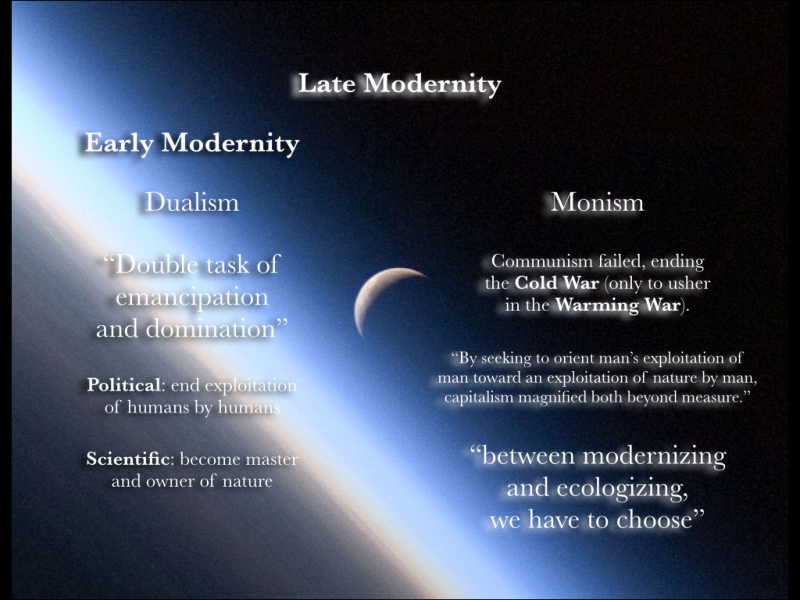
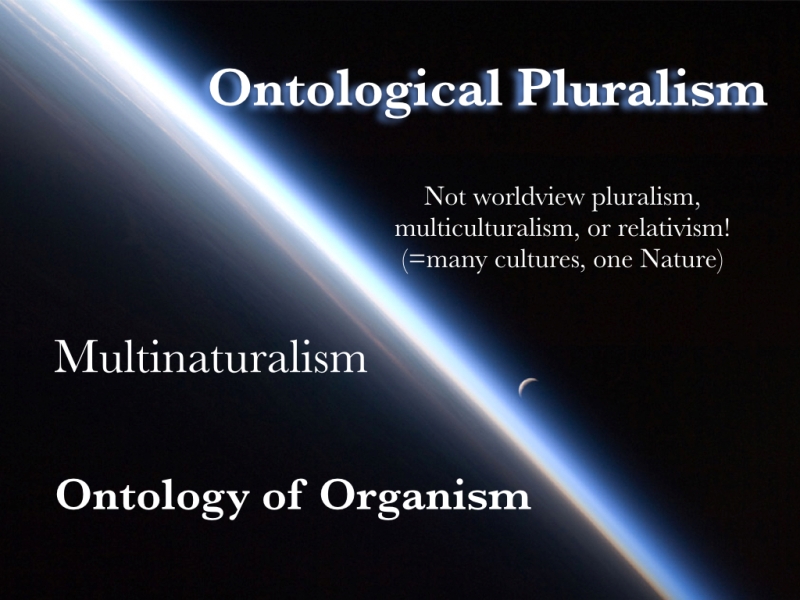
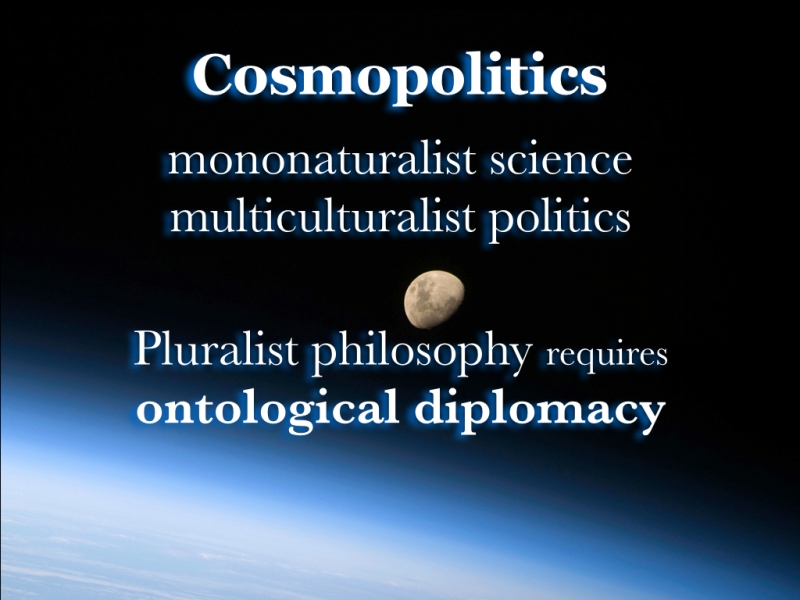
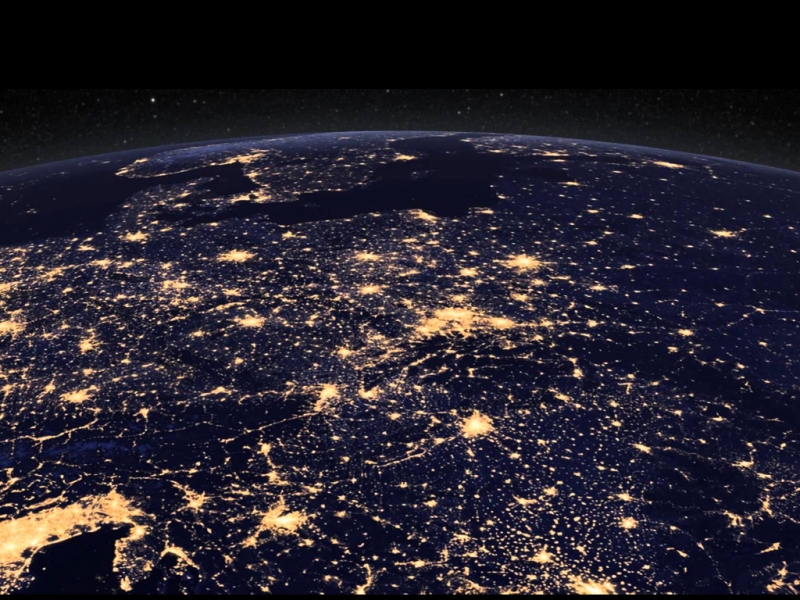
No comments:
Post a Comment